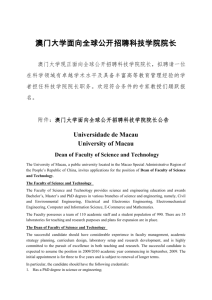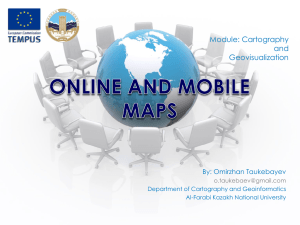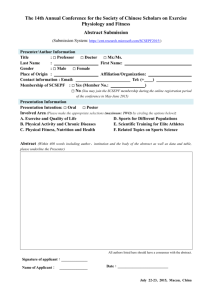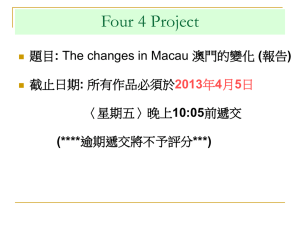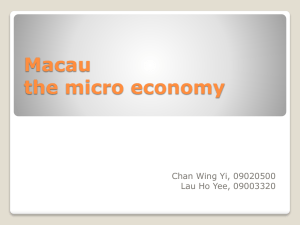Effectuation Good Governance in Public
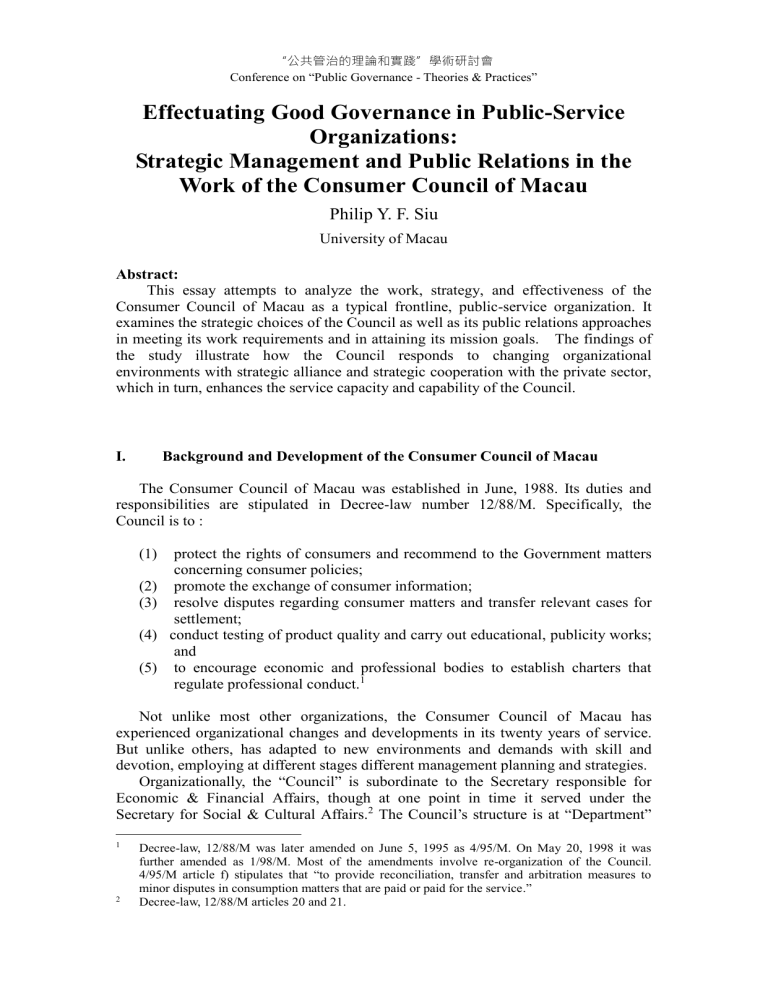
“公共管治的理論和實踐”學術研討會
Conference on “Public Governance - Theories & Practices”
Effectuating Good Governance in Public-Service
Organizations:
Strategic Management and Public Relations in the
Work of the Consumer Council of Macau
Philip Y. F. Siu
University of Macau
Abstract:
This essay attempts to analyze the work, strategy, and effectiveness of the
Consumer Council of Macau as a typical frontline, public-service organization. It examines the strategic choices of the Council as well as its public relations approaches in meeting its work requirements and in attaining its mission goals. The findings of the study illustrate how the Council responds to changing organizational environments with strategic alliance and strategic cooperation with the private sector, which in turn, enhances the service capacity and capability of the Council.
I.
Background and Development of the Consumer Council of Macau
The Consumer Council of Macau was established in June, 1988. Its duties and responsibilities are stipulated in Decree-law number 12/88/M. Specifically, the
Council is to :
(1) protect the rights of consumers and recommend to the Government matters concerning consumer policies;
(2) promote the exchange of consumer information;
(3) resolve disputes regarding consumer matters and transfer relevant cases for settlement;
(4) conduct testing of product quality and carry out educational, publicity works; and
(5) to encourage economic and professional bodies to establish charters that regulate professional conduct.
1
Not unlike most other organizations, the Consumer Council of Macau has experienced organizational changes and developments in its twenty years of service.
But unlike others, has adapted to new environments and demands with skill and devotion, employing at different stages different management planning and strategies.
Organizationally, the “Council” is subordinate to the Secretary responsible for
Economic & Financial Affairs, though at one point in time it served under the
Secretary for Social & Cultural Affairs.
2
The Council’s structure is at “Department”
1 Decree-law, 12/88/M was later amended on June 5, 1995 as 4/95/M. On May 20, 1998 it was further amended as 1/98/M. Most of the amendments involve re-organization of the Council.
4/95/M article f) stipulates that “to provide reconciliation, transfer and arbitration measures to minor disputes in consumption matters that are paid or paid for the service.”
2 Decree-law, 12/88/M articles 20 and 21.
“公共管治的理論和實踐”學術研討會
Conference on “Public Governance - Theories & Practices” level, which is immediately below the “Directorate”, a level under the Secretary.
Functionally, the Council enjoys relatively more autonomy in its operation since its inception. The highest authority is the “Assembly” of the Council; however, the
“Executive Committee” of the “Assembly” is discharged with authorities to administer day-to-day responsibilities of the Council. The budget of the Council is at about MOP 10 million in 2005 and MOP 11,500,00 in 2006. Virtually all the appropriations of the Council are from the regular budget of the Government, and are expensed on staff remuneration and promotional activities.
3
The establishment of the Council owes its origin to the existing realities of Macau at the time of its inception in the 1980s--the Government was either apathetic to or pre-occupied with other more pressing political problems to be able to address itself to social issues, let alone “consumers’ rights” issues. Against this background, one of the
Legislators, Alexander Ho, took up the issue and made thoughtful studies of the problem. Ho was a directly-elected candidate in the reformed Legislature of 1984 that provided, for the first time, representation of the public through elections. Ho served from 1984 to 1996 and was regarded as a rather liberal and devoted legislator who cared about grass-root interests.
Ho was also the first directly-elected Legislator to offer open, office hours to the public. Due to his exposure to and contact with the public, he came to entertain countless cases of queries or complaints regarding consumer affairs. The result was a nascent organization created for that purpose.
4
In the period from 1990 to 1996, the work of the Consumer Council was constrained by the atmosphere of political change in the Government. It was at a time when the future status of nearby Hong Kong had been resolved between China and
Great Britain, resulting almost simultaneously in a call for resolution of the Macau enclave between China and Portugal. At this time, the work of the Council, which was essentially a service-oriented one centering around complaints and their resolution, had but to focus on publicity and promotional activities. In the concept of Kurt
Lewin’s “Force-Field Theory”, it was a time of “freeze” of the organization’s inertia for development and change.
5
II Strategic Management and Strategic Alliance in the Work of the Consumer
Council of Macau
Ever since Peter Drucker’s 6 MBO (Management-by-Objectives) theory set in motion the employment of military concepts in the field of management science, the application of strategic studies to planning and management in both the private as well as the public sector has been in vogue. Stemming largely from the “strategy” concept
3 Internal documents of Consumer Council.
4 Prior to the Consumer Council, Alexander Ho’s “Office” as Legislator was located in the heart of the business district in Macau, Avenida de Praia Grande Soares. The “Office” was officiated by Mr.
Assumpcao, then President of the Legislative Assembly. Father Lam Ka Chun, archbishop of the
Catholic Church and Mr. Szeto Wah, President of the Professional Educators Association of H.K. in Nov, 1984. The present author of this paper served as Advisor to the “Office.”
5 See, for Kurt Lwein’s “Force-Field Theory”, Resolving Social Conflicts & Field Theory in Social
Sciences. Washington, D.C.: American Psychological Association, 1997.
6 Peter Drucker has been regarded as “Father of Management Science”. He passed away in
California on Nov. 11, 2005. His last writing, The Next Society was partially revealed in, The
Flame, an alumni magazine of the Graduate University of Claremont, where Professor Drucker served. The present author was his student in the 1970s.
“公共管治的理論和實踐”學術研討會
Conference on “Public Governance - Theories & Practices” o T.C. Schelling in his “Cold War” studies in the early 1960s and expanded further subsequently by other scholars such as Michael Porter, C.A. Barlett, H. Mintzberg and
J.B. Quinn,
7
“strategic management” has managed to capture the attention of business executives and academic scholars alike. John Byrne’s comment is not an exaggeration:
Executives, consultants, and B-school professors all agree that strategic planning is now the single most important management issue and will remain so for the next five years. Strategy has become a part of the main agenda at a lot of organizations today.
Strategic planning is back with a vengeance.
8
The impact of the trend extends beyond time and place. Our subsequent analysis will show how “strategic management” has received the attention of the public sector in Macau and, in particular, how it has been applied effectively in the work of the
Consumer Council. But before we do that, a recapitulation of the definition of
“strategic management” is in order.
According to Fred R. David, “strategic management” is the “art and science of formulating, implementing and evaluating cross-functional decisions that enable an organization to achieve its objectives”
9
One may also discern from other major writings the following concepts:
(1) to realize the “core value” of an organization;
(2) to achieve organizational goals with flexibility and with an effective operational mode;
(3) to place emphasis and use professional management knowledge, know-how and strategy in the planning and operationalization of an organization;
(4) emphasis on the communication within and outside of an organization;
(5) to evaluate an organization’s internal and external environment and make corresponding strategic adjustments;
(6) employing “performance” as an important management objective and indicator;
(7) to maintain close relations and to communicate with individuals, groups or other “stakeholders” with a view to taking care of their interests and thereby gain their support.
10
In 1998, the Consumer Council of Macau established its “Adherent Shops” (i.e. participating shops) and on this basis added another mechanism, “Certified Shops”
(i.e. accredited shops) in 2001. The two initiatives are important strategic innovations in promoting the operation of the Council and its legitimacy in terms of “public acceptance” and support. If one examines the “mission,” “objectives” and
7 See, Fred R. David, Strategic Management; Concept and Cases. N.Y.: Prentice-Hall, 2001. H.
Mintberg serves as cleghorn Professor at M. Gill University, See his, The Strategy Process:
Concepts Contexts and Cases. N.Y.: Pearson, 1991, especially pp. 16-21. Michael Porter is
Professor at Harvard University, recognized as one of leading authors on Strategic Management and SWOT Theory.
8 See, as quoted in Fred R. David, Strategic Management: Concepts and Cases. op. cit.3.
9 See, Fred R. David, ibid, p.5.
10 See, Fred R, David, ibid, p.5-15 and chapter 9 on “Strategic Evaluation,” pp. 300-322.
“公共管治的理論和實踐”學術研討會
Conference on “Public Governance - Theories & Practices”
“development” 11 of the Council, one discerns that this “strategic management” signifies a change of the Council’s organizational mode from a Weberian-type government department to a “public service” – oriented one.
Both the “Adherent Shops” and the “Certified Shops” are granted recognition and certification by the Council, and their names will be covered in official publications, websites and publicity materials.
From a business perspective, the measure is a welcomed incentive. However, once becoming a participating member, an “Adherent Shop” will need to make a promise that it agrees to let the Consumer Council’s “Consumer Arbitration Centre” handle a case in dispute should there be any between it and a consumer and a shop. “Certified
Shop,” on the other hand, is a “yearly” award of recognition. From a strategic management perspective, a “Certified Shop” is required to have met four conditions:
(1) that the shop which applies (for the award) has no record of consumer complaint against it in the year before;
(2) the applying shop voluntarily complies with the regulations set by the
Council and make the promises required thereof, such as to have a policy of return of goods and not to sell sub-standard products or fakes etc;
(3) that the applying shop has practiced and not breached the “Professional
Code” established by the respective professions and,
(4) that it has met the “grading” system established by the Council and has passed an “anonymous customer” check on the shop for the year concerned.
12
Hong Kong. However, it is in a way more sophisticated in that it requires the shops to participate in the “Consumer Arbitration Centre,” – which is not offered at the
“Excellent Travel Scheme” – making it more viable in gaining consumer confidence.
This practice is compatible with the “Excellent Travel Scheme” established in
III From “Strategic Management” to “Strategic Alliance”—“Consumer
Arbitration Centre” and Conflict Resolution of the Consumer Council”
The “Consumer Arbitration Centre” was officially set up in March 1998. Shops participating in the scheme need not pay any fees but gain considerable publicity.
Therefore, the number of shops joining has increased rapidly and has attracted shops from various trades and professions.
13
This success resulting from the strategic linkage between the “Certified Shop” and the “Arbitration Centre” can be substantiated by looking at some figures: the amount to receive arbitration has risen from the original MOP 25,000 to MOP 50,000; and by May 2007, the “Adherent
Shops” have amounted to 1,100, whereas the number of “Certified Shops” have gone up to 730, 14 showing that the plan is well-received and actively – implemented.
As said before, the “Consumer Arbitration Centre” was established in 1998. Each
11 the “mission statement” of the Consumer Council is a requirement of the Government of Macau in its “New Public Management”-led administrative reform. Various departments carry out “ISO”,
“Performance Pledge” & “One-Stop Service” etc., especially from 2002 onwards.
12 Alexander Ho, Chairman, Executive Committee, Consumer Council. See, “Harmonious
Consumption,” Conference Speech, Hanchou, June 20, 2007, p.4.
13 Ibid, p. 3-4.
14 See, Macau Consumption, Macau: Consumer Council of Macau, 2007/03 no. 165
“公共管治的理論和實踐”學術研討會
Conference on “Public Governance - Theories & Practices” year, the Consumer Council receives and handles about 4,000 cases of complaints and disputes.
15
The items being dealt with in January – June, 2007 include:
(1) real-estate : 532 cases (28.43% of total);
(2) food and beverages: 149 (7.96%);
(3) communication equipments: 147 (7.85%);
(4) telephone services: 114 (6.09%);
(5) electrical; appliances: 103(5.5%);
(6) clothing & leather goods: 72 (3.85%);
(7) tourism: 70 (3.74%);
(8) furniture & household items: 66 (3.53%);
(9) public transportation: 61 (3.26%);
(10) public utilities: 53 (2.83%);
(11) computer & related products: 52 (2.78%);
(12) personal care products &services: 46 (2.46%);
(13) catering services: 41 (2.19%);
(14) financial services: 34 (1.82%) and,
(15) transport vehicles: 33 (1.76%) etc.
16
Cases of the above that have been handled by the “Consumer Arbitration Centre” amounted to 60 each year.
17
The process of administration takes about 7-10 days from acceptance of the case to its verdict. The looser in the case does not have to pay for the court fees. The presiding judge is a serving judge in the judiciary but renders service on a voluntary basis; however, his engagement has to be approved by the
Chief Judge of the Court of Final Appeals. So far, the “Arbitration Centre” has invited altogether 3 judges from the Lower Court to discharge the duties. Files of the cases will be kept in strict confidence and deposited with the Consumer Council.
18
Generally speaking, the “Centre” will first attempt “reconciliation” (like, return of goods) before proceeding to a “trial” (e.g. indemnity). As the cases have increased in recent years in large numbers (for example, in 2002 with 3442 cases, in 2003 increased to 4217; and in 2004 further increased to 4198 and, again, in 2005 rose to
4802; in 2006, there were 4865 cases; in January – June, 2007, 2685 cases have been recorded).
19
One of the reasons of the increasing need for arbitration is due to the rapid development of Macau in the last ten years and after the liberalization of the gambling industry, in particular. These changing facets contribute to, and are reflected in, the strategy and strategic adjustments of the Consumer Council.
IV Strategic Alliance and Control over Organizational Environment
As a “public service” organization, the organizational environment in which the
Consumer Council is embedded and has to adapt to is ever–changing Consumers in
Macau have experienced important, quick changes corresponding to the economic
15 See, Alexander Ho, Conference Speech op.cit., p. 3. Also, interview with Alexander Ho, July 29,
2007.
16 See, Macau Consumption Macau: Consumer Council of Macau, 2007/07/no 169, p.6
17 interview with Alexander Ho, see footnote#15.
18 ibid.
19 internal information, Consumer Council of Macau; for data on Jan-June, 2007, see Macau
Consumption, 2007/7/no. 169 pp. 6-7.
“公共管治的理論和實踐”學術研討會
Conference on “Public Governance - Theories & Practices” transition of Macu to the gambling–tourism–led industry. As of the end of January,
2007, the median in the income earnings of Macau people is MOP 7,318, 16.3% higher than that in 2006 (MOP 6,795) and 25.3% higher than the cumulative increase in the period between 2004 – 2006. The average income of Macau people has reached
MOP 9,984 (U.S.$ 1,280);
20
surpassing that of Hong Kong people for the first time in recent history. This change signifies that the consumption power along with the increase in income has gone up, resulting in rising consciousness of consumer rights and consumer choice.
In respect of information (inquiry) service, in the first six months of 2007, the
“Council” has entertained notable increase in cases that involve goods and services that are directly related to or stem from rapid economic development: real–estate: 101
(12.42% of total); food & beverages: 62 (7.63%); electrical products: 38 (4.67%); communication equipment: 36 (4.43%): tourism: 33 (4.06%): telephone service: 20
(2.46%); computer and related products: 17 (2.09%); insurance: 16 (1.97%); and services related to the Government on the above: 173 (21.28% of total).
21
As the policy of “self–guided tour” of China has resulted in large influx of tourists into Macau in 2006 and 2007, the Consumer Council of Macau has embarked on yet another kind of “strategic alliance” – alliance with compatible consumer organizations in mainland China for co-operation and development.
Strategic Alliance: Agreement between the “All-National Industry & Commerce
Federation of China ”and the “Consumer Council of Macau”
Apart from the existing cooperation agreements with Portugal (1998), Spain (2005) and Hong Kong (2006), the Council signed a “Quality Certification Shops” co-operation agreement with China’s “All-National Industry & Commerce
Federation” in 2007. The “Agreement” stipulates that the “Association of Tourist
Companies” of China and the Consumer Council will have close oversight over the activities of the companies, and through specific channels, the two parties will work to resolve disputes or complaints together. Whenever the “Tourist Companies
Association” receives a case related to Macau, it will transfer it to the Macau
Consumer Council within 15 days of receipt, and the latter will handle the case according to law while respecting the privacy and confidentiality of the person(s) involved. The Council will reply to the “Association” in China or provide it with suggestion for follow-up actions.
22
Strategic Alliance: The Consumer Council of Macau and Mainland China’s
Consumer Organizations
Further to the agreement with the business sector in China as discussed above, the
Consumer Council of Macau has also entered into cooperation agreements with consumer organizations in China, strengthening information exchange and expanding on networking of dispute-settlements of consumer affairs. As of September 2007, there are 18 organizations having formal agreements with the Consumer Council of
Macau:
20 See, Monthly Monetary Statistics Bulletin (1 March, 2007), Macau: Macau Government.
21 Macau Consumption. Macau: Consumer Council of Macau, (2007/07/mo.169) p.7.
22 Macau Consumption; op. cit. (2007/07/no.169).
“公共管治的理論和實踐”學術研討會
Conference on “Public Governance - Theories & Practices”
(1) “Zhuhai Consumer Council”;
(2) “Guangdong Consumer Council”;
(3) “Guangsi Chuangju Autonomous Region Consumer Council”;
(4) “Beijing Consumer Council”;
(5) “Shanghai-City Consumer’s Rights Protection Council”;
(6) “Chungching-City Consumer’s Rights Protection Council”;
(7) “Kweizhou Consumers Council”;
(8) “Chekiang Consumer’s Rights Protection Council”;
(9) “Hunan Consumers Council”;
(10) “Hainan Consumers Council”;
(11) “Jiangsi Consumers Council”;
(12) Tianjin Consumer Federation”;
(13) “Shenzhen-City Consumer’s Council”; and
(14) “Hong Kong Consumer’s Council” etc.
23
The strategic alliance between the Council and their counterparts in China not only enables “Government—Shop—Consumer” tripartite interaction and cooperation, it creates for the Council itself “organizational development” space and channels (e.g. plurality in service; cross-border networking; local organizations etc).
Organizational Environment Control: The Establishment of “Professional Code in Macau’s Private Sector”
One of the legally-assigned duties of the Consumer Council of Macau is its mandate to “encourage economic and professional groups to establish codes that govern their activities.
24
Since the inception of “Certified Shop”, the Council proceeds to work on a more profession-oriented, “self-disciplined” and “systematized”
“Professional Code” for various services. From the first one started in 2002, as of
May 2007, the Council has established such a code for professions in
(1) communication and computer products;
(2) laundry;
(3) retail of home electrical appliances;
(4) retail of birds’ net;
(5) retail of gold & jewelry;
(6) calculators & information;
(7) real – estate & agent;
(8) drugstore;
(9) stores & supermarket;
(10) beauty salons; and
(11) retail of clothings & leather goods.
25
Of the above, the “Professional Code” on “real –estate and agents” is particularly
23 internal document, Consumer Council of Macau; interview with Alexander Ho, op. cit., July 29,
2007; some of these organizations actually have co-operation agreements with the “Council” preceding that with the “All-National Industry and Commence Federation of China.”
24 Decree-law 12/88/M, article 13 E)
25 internal document, Consumer Council of Macau. Each “Professor Code” will be published in
Chinese and English for public perusal. See, http://www.consumer.gov.mo/
“公共管治的理論和實踐”學術研討會
Conference on “Public Governance - Theories & Practices” important in a time of economics boom and that Macau, hitherto, has not had similar measures of regulations in the sector, making the trade in property markets not unified or uniform in standards and practice. The coming into age of “Professional Code” serves to resolve disputes in a “pre-emptive” way. It also provides impetus for growth and improvement in the sector in the long run. The latter is important if Macau is to attract international investments in the period after liberalization of gambling industry.
Emile Durkheim points out insightfully in his Professional Ethics the indispensable ingredient of ethics in organizational life.
26 In advanced countries such as U.S,, Japan or European ones, “professional ethics” is part and parcel of
“Professional Code”. The work initiated by Macau’s “Consumer Council” is timely and worthwhile of support.
Public Relations as a Component Part of Strategic Management in the Consumer
Council–of Macau
The work of the Consumer Council of Macau is multi-faceted. Apart form its mandate – to protect consumers’ rights- - through its twenty years of service, it has carried out services in consultation, complaints, arbitration, publicity, education, communication, promotion, contacts, discussions, testings, and verifications etc.
27
Public Relations works in the Consumer Council have notably shifted from publicity matters to the more “interactive” activities. The strategy is in line with
Public Relations theories and concepts, which in recent years have found that
“image” – centered activities are preferable to “language” (i.e. letters)–based efforts.
The former can attract attention and gain the confidence of the message–ecipients.
28
J. Gruning and T. Hunt – two leading scholars on communication in public relations – have delineated 4 models of public relations strategy:
29
(1) press agentry model (i.e. accurate, activities from the perspective and interest of the organization itself;
(2) public information model (i.e. accurate, but from top down, one-way and releasing of public information);
(3) two-way asymmetric model (i.e. two-way flow but not equal, information from the stand point of the organization).
(4) two-way symmetrical model (i.e. equal in relations, and respecting the public as its orientation in the public relations works of an organization, an ideal situation).
26 For a thorough analysis of Durkheim’s thesis, see the able writing of Anthony Giddens, Capitalism
& Modern Social Theory. Cambridge: Cambridge University Press, 1974. Also, recently Jűrgen
Mackert of Humboldt University has delineated the relationship of ethics and organizational development in Durkheim’s writings; see, “Reorganization and Mechanisms in Emile Durkheim’s
Professional Ethics and Civic Morals: A Contribution to the Explanation of Social Processes,
“Journal of Classical Sociology, vol.4, No.3, 2004, pp.311-336.
27 Talk by Alexander Ho in the present author’s class on “Public Relations” on Nov. 12, 2006,
University of Macau.
28 See, Jane Johnston and Clara Zawawi (ed.) Public Relations. NSW Australia: Allen & Unwin,
2004, especially chapter 5 on “ethics”. Pp. 104-134.
29 See, J. Grunig & L. Grunig, “Models of Public Relations and Communication,” in James Grunig
(ed.), Excellence in Public Relations and Communication Management. N.Y.: Holt, Rinehart &
Winston, 1984.
“公共管治的理論和實踐”學術研討會
Conference on “Public Governance - Theories & Practices”
The public relations strategy of the Consumer Council of Macau seem to have fallenfall within the second and the third models, and is moving towards the fourth model. In its inception phase, from 1989-1993, Grunig & Hunt’s second model appropriately describes its approach. However, with the establishment of the
“Certified Shop”, which requires the party to be evaluated and observed for one year, the strategy seems compatible with that prescribed in the third model. Starting from
2005, responding to the increasing number of tourists under the “self-guided tour” policy of China, the Consumer Council was taken the initiative to establish various
“Professional Codes” in co-operation with the trades concerned. This move, it would appear, is more symmetrical in nature and has since been adopted as a major public relations strategy, contributing, in an important way, to the establishment of the ensuing “strategic alliances” and their subsequent success.
In early 2007, the “Institute for Sustainable Development” under the auspices of the Macau University of Science and Technology has conducted a survey on the work of the Consumer Council. Of the 407 respondents, 52% know of the “Adherent Shop” and the “Certified Shop”, while 66.8% will choose to spend in shops that carry
“Adherent Shop” or “Certified Shop” logos. The study affirms the effectiveness of the public relations strategy though it suggests improvements on the design of the two logos in order to enhance their visual effects.
30
As people in Macau tend to watch the T.V. programs of Hong Kong channels the
Consumer Council of Macau has recently (2006 & 2007) tried to release its test results on products (such as cosmetics and food) alongside with that released by the counterpart organization in Hong Kong. (The Hong Kong Consumers Council), enhancing its service capacity and news reception effectiveness.
VI From Strategic Management to Harmonious Consumptio n and concluding
Remarks
The Consumer Council of China has designated its activities in 2007 to be under the theme of “Harmonious Consumption”. In the case of Macau, the call brings out three related issues:
31
(1) Can the Consumer Council place itself in a harmonious situation with the producers in the process and not stand in an opposite direction?
(2) Can organizations protecting consumers’ rights and interests and the employ harmonious means in balancing interests of all sides?
(3) What should be the “core values” of a consumer council? What are the strategies to maintain harmony and sustainable development?
As Macau has become a city open to the world, it invariably needs to improve on its service capacity and image. The work of the Consumer Council inevitably takes more load than ever before. On the other hand, being a “front-line”, service organization it will become more and more receptive to the public (and publics) at large, responding to new demands while maintaining its core values and self-imposed missions.
Throughout our analysis, we have found the Council to be dynamic and
30 See, Macau Consumption; op.cit. (2007/07/no.169) p.16.
31 the first two issues were raised by Alexander Ho at a Conference on “Harmonious Consumption” in China, see footnote#12.
“公共管治的理論和實踐”學術研討會
Conference on “Public Governance - Theories & Practices” adaptative. It demonstrates vigor and zeal in its mission statement. Its organizational development is well-chartered, not constrained by scarce financial resources or man-power. In the beginning years, the Council is handicapped by the requirements of time, the priorities of the Government being set in political or security affairs (before
1999 and 2000-2002 respectively).
The contribution of the Council is noted in its establishments of “Adherent
Shop” and “Certified Shop”. The two innovations have given consumers confidence in not only products but also the economy. It will not be superfluous to think of
Macau residents shopping even more frequently in China if trusts in local shops are lost.
The “Alliance Strategies” made with internal or external (China) organizations are significant steps in the process of consumer rights. Together with the institutionalization of “Professional Code” for various trades and services, they
“pre-empt” policy problems in producer consumer conflict. This “pre-emptive” nature of strategic management is well studied and applied in the military, police, prison, mental wards, elderly homes, child-care centers and helping institutions.
To what extent the Consumer Council of Macau succeeds to capitalize on the
“council–shops–consumer” tripartite relationship it has developed is contingent upon its legitimacy (legal status + technical competence + public acceptance). Skill and receptiveness to change as a “public–service” organization. If one is endowed with the wisdom contained in the SWOT (Competition Strategy) of Michael Porters, one will find the strength (S) of the Council to be in its status and role, its weakness (W) to be a lack of organizational development amidst time and unfavorable organizational environment (transition of sovereignty); its opportunity (0) to be the economic prosperity of Macau after the liberalization of gambling industry, and its threats (T) to be the rising expectations of the consumers and the corresponding complexity in resolution of conflicts.
It is obvious that the Consumer Council of Macau has made substantial contributions to the consumers, public, producers and tourists in its 20 years of dedicated service. The attainment made will be accredited to the Government and the civil servants serving therein. At a time when Macau emerges to be successful exemplary of China’s “one-country two-systems,” the Special Administrative Region of Macau partakes of the fame and shares the onerous task of its sustenance. One way of maintaining Macau’s image and prestige is to gain the confidence and good impression of tourists, be it from the mainland or else where. Everywhere, the popularity of a place is measured not just by its strength but also by its strength in providing help and to improve. The grace of Macau rests on courtesy and help, and their practice. It is incumbent upon the Government and the public organizations to facilitate that reality.
In this regard, the work of the Consumer Council has added meaning and
Consumer Council has added meaning and significance. To further its service, the
Council may explore the following areas for development:
(1) run more product testing in designated products or trades so that the results may be of impact and greater relevance in the community (one example is gold; another is telecommunication or real-estate management);
(2) co-operate with higher-learing institutions in promoting the mission, image and tasks of the Consumer Council (e.g. seminars, student ambassadors, publicity work); and
“公共管治的理論和實踐”學術研討會
Conference on “Public Governance - Theories & Practices”
(3) co-operate with the mass media and educate the public with special series
(such as “People’s Court” in U.S.A.), so that both producers, shops and consumers know more about consumer rights (and responsibilities).
The Consumer Council has rendered very important service through effective strategic management and public relations work. It should be furnished with more opportunities in enhancing its service capacity. Perhaps the most direct way is to elevate its status to a “Directorate” level, a view widely held by the public and is shared in this study.
***
